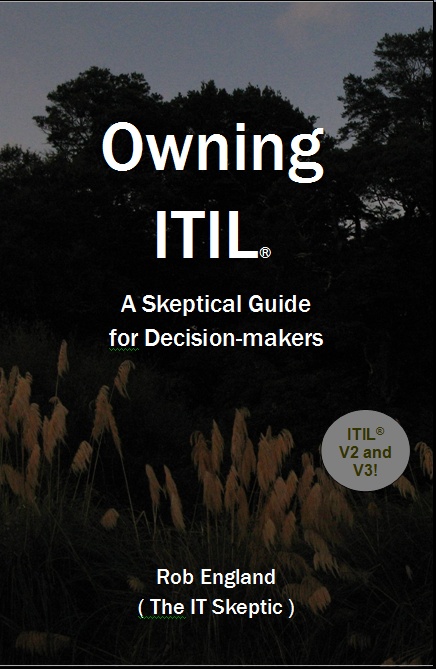The IT Infrastructure Library
 This book is essential reading for all decision makers (IT-literate or not) who are presented with an ITIL® proposal or who are asked to oversee an ITIL project, or who find something called “ITIL” or “Service Management” in their budget. It tells you what the ITIL industry won’t. For everyone else involved in ITIL projects, this book is just as essential to help you through the ITIL minefield.
This book is essential reading for all decision makers (IT-literate or not) who are presented with an ITIL® proposal or who are asked to oversee an ITIL project, or who find something called “ITIL” or “Service Management” in their budget. It tells you what the ITIL industry won’t. For everyone else involved in ITIL projects, this book is just as essential to help you through the ITIL minefield.
Now available on Kindle.
Recent ITIL certification stats published by EXIN that originate from APMG show clearly that over quarter of a million ITIL certifications are issued every year (extrapolating the 9 months of stats).
200,000 of them are V2 and V3 Foundations. V3 Foundations outnumber V2 Foundations by about 6:1. So every year we certify another 200k ITILers. Think about it: three years of V3 certs, plus a decade of V2 certs. There was a rumour a while ago on twitter that we'd passed the million. I have no doubt it was true. As Mythbusters would say: "plausible"
Oh dear. “The heart of ITIL is the CMDB”? No it isn’t. Not unless you are looking at ITIL from underneath. Yet another example of inside-out thinking instead of outside-in. Do customers care about the CMDB more than the Catalogue? No. Is ITSM about being customer-focused and service-centric? Well, I thought so.
The heart of ITIL is the service catalogue.
There's a lot of rubbish on the Web about ITIL (not on this blog of course). Take Service Owner. Actually there's a lot of rubbish in ITIL about Service Owner, or rather a lot of ambiguity and not a little outright contradiction. So it's hard to blame other web authors. But really, look at this:
Pierre Bernard over at Pink Elephant had a "personal rant" about "people «complaining» about the ITIL® V3 scheme" and "much negativity presently in various blogs and social media sites about the ITIL® v3 scheme". That'd be me, for one, so I feel compelled to comment.
Maybe I missed it, but ITIL V3 doesn't appear to have one person owning and accountable for the customer experience. I don't mean for one service, for one process, for one customer: all of it.
The IT Skeptic was pretty scathing of Malcolm Fry's first ITIL V3 Complementary Publication, Building an ITIL-Based Service Management Department. Personally I wouldn't buy it (again). Malcolm's second "official" V3 book ITIL Lite is different. It is worth buying just for Chapter 2: "a simple but effective approach to ITIL process engineering". I got several great ideas from it and the overall methodology is a good one. But ITIL Lite has several fundamental assumptions that many will disagree with. These assumptions will mislead an already confused user community, and I think they spoil the rest of the book.
The IT Skeptic rails against Crap Factoids often enough. They're rubbish. They're even funnier when the results undermine the position of the hype-merchants keen to push them. Everyone waves around Gartner's numbers in support of their own positions, blithely ignoring the fact that Gartner just pull these statistics out of their own ...ahem... analyst. I don't see any of the ITIL zealots quoting this set though. Check out slide 7 "Polling Results: Characterization of ITIL Adoption".
It is clear from reading a recent complaint report from the British Government agency OPSI (the Office of Public Sector Information,
part of the National Archives) that OGC and Van Haren Publishing aren't best mates any more. VHP allege a number of non-competitive practices, most of which OGC managed to duck as being outside the scope of OPSI's remit. Read the report yourself for the detail, but I take some interesting points from it:
